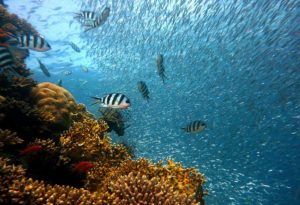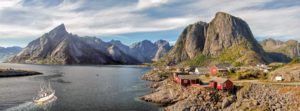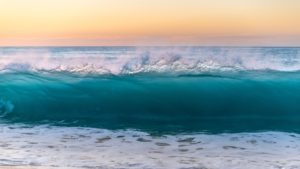In this interview we hear from Thor Sigfusson, founder of the Iceland Ocean Cluster. We discuss the beginnings of the Iceland Ocean Cluster, its future, and the role of ocean clusters and startups in rejuvenating ocean industries.
The Liquid Grid [TLG]: What led to the creation of the Iceland Ocean Cluster? What were the essential ingredients that led to its creation?
Iceland Ocean Cluster [IOC]: The Iceland Ocean Cluster (IOC) started as a research project at the University of Iceland in 2011, but since then has become a vital part of the “new” seafood industry in the country where cross-pollination between old wisdom and new knowledge has rejuvenated the industry.
The initial study at the University of Iceland showed that tech entrepreneurs in the seafood industry were communicating among themselves in ways which were different to other industries. While entrepreneurs in industries like software formed larger and more dynamic networks with many contacts, those in seafood tech had smaller and more close-knit networks. The larger networks opened new market and sales channels and seemed more effective. We wondered why we couldn’t forge more of these kinds of networks in natural resource industries, such as fisheries, providing entrepreneurs more opportunities to connect with a wider network of people with more diverse backgrounds. The IOC was initiated with this goal in mind. We believe that there is value in diversity and that when many companies come together in the “new” seafood industry, they’re greater than the sum of their parts and can create innovative solutions to old problems.
[TLG]: What unique value does the Iceland Ocean House offer to the marine technology startup community?
[IOC]: The Ocean Cluster House is an innovation hub which we opened in 2012 and has now 70 companies as tenants. It is now self-sustaining and not subsidised by the government. The IOC has members all over Iceland and some of them are tenants in the Ocean Cluster House. The success of The Ocean Cluster House is a result of cross-pollination of our members. A recent study by the IOC shows that over 70% of the companies in The Ocean Cluster House have collaborated with another company in this facility and the diversity of the companies is crucial; everything from fish gear to nutriceuticals from seafood proteins. Diversity matters in other ways too; we’re proud of the fact that nearly half of the startups in our program are owned and/or operated by women entrepreneurs.

[TLG]: Does the Iceland Ocean Cluster focus on sectors within the blue economy? Why those, if any? What’s the long-term vision?
[IOC]: Iceland is a seafood country and we chose that sector as our initial focus. But since our founding we have rapidly expanded into other fields such as biotechnology, clean marine technology, and others. We are very proud to see many of the startups that have been nurtured in the Iceland Ocean Cluster House take a flight in industry! Mark Kurlansky, the author of “Cod, A Biography of the Fish That Changed the World”, wrote a short message in my new book “The New Fish Wave”:
“The one advantage of a small country is that it could become a model country, which would not be enough to save the planet, but it could set the example.”
I believe that is what we are doing at the Ocean Cluster, developing startups that can make a difference to our ocean environment.
[TLG]: There are tons of amazing technologies under development in the blue economy, which ones are you most excited to see Iceland Ocean Cluster support, either now or in the future?
[IOC]: I am very pleased to see companies and startups across the ocean industry in Iceland emphasising environmental stewardship by introducing better and greener technology. We see different types of collaboration among these groups, some of which can be traced back to Iceland Ocean Cluster’s work in this space. Just to name a few interesting projects that we’re tracking:
- New bottom trawl doors that do not touch the seabed have been invented. These are controllable doors that float above the seabed which drastically reduce vessel energy consumption and damage to the environment.
- IT companies are focusing on solutions that can increase traceability of seafood products so that the consumer can be more certain about the origin and the quality of the seafood product. With new fish processing technology comes more yield and higher seafood quality — hopefully, we can do more with less in the fishing industry with these technologies.
- Engineering firms in the field of naval architecture are introducing new energy efficient ships with novel power trains, such as entirely electric boats with no CO2 emissions.
- On fishing boats, new cooling technology for shipboard use eliminate the need for ice which saves the vessel operator money on energy expenses and increases the catch quality.

[TLG]: I hear the Iceland Ocean Cluster works with other similar organizations around the world, including a couple here in the U.S. What are your thoughts on the ability to replicate the Iceland Ocean Cluster model in other parts of the world? What are some of the challenges in doing that?
[IOC]: We knew early on that our model could work in other countries. Our interest in forming a network of clusters was sparked by our visits to various coastal areas in Europe and North America. I was approached by people in charge of waste disposal units of various municipalities who told me one of their biggest challenges was how to get rid of fish waste. Most of it became landfill! They told me the amount of fish waste, both from fisheries and aquaculture, was a significant problem in their operations. “Fish waste” is a term which Icelanders rarely use, as we see all the parts of the fish as protein and a valuable commodity. I believe that coastal communities have much to learn from one another.
In January 2020 my new book “The New Fish Wave” will be released and which I hope will be a useful manual to those interested in following our model and rejuvenating struggling fisheries in coastal areas. We will soon open our web page http://leetesislandbooks.com/new-fish-wave . In this book I address various challenges and the importance of having industry on board, strong infrastructure, good connections with R&D, Universities and the startup world, just to name a few.
[TLG]: The Liquid Grid has lots of entrepreneurial readers, how can they and other marine technology startups best work with Iceland Ocean Cluster?
[IOC]: We would love to hear from your readers and find ways to connect them to our network. We have also offered interested entrepreneurs the opportunity to stay in our facilities for free to see if we can somehow make the ocean world a better place! Our website oceancluster.is has all the info. I am also looking forward to opening our sister-house in Portland, Maine early 2020. You can follow our amazing team in Portland, Maine on www.newenglandoceancluster.com

Thor Sigfusson is an entrepreneur and a writer. He founded The Iceland Ocean Cluster (2011) and the Ocean Cluster House (2012). The Iceland Ocean Cluster Cluster was initiated as a part of his PhD research into networks of international entrepreneurs in the marine sector. Thor is the co-founder of Codland (2012), founder of Collagen Ltd. (2013), co-founder of Ocean Excellence (2012), co-founder of Reykjavik Foods 2016, co-founder of Hlemmur Food Hall and Grandi Food Hall 2016. He has written eight books on subjects such as internationalisation and salmon. His new book “The New Fish Wave” will be published in the US early 2020.




